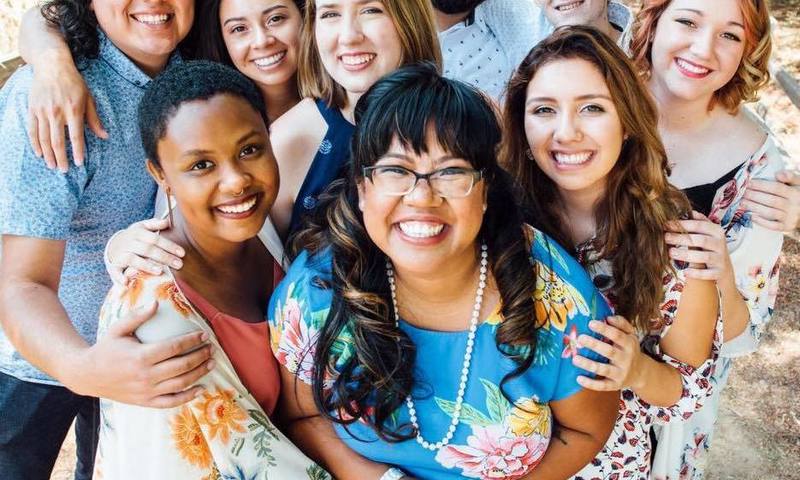October is Filipino American History Month, and to celebrate, GRIT asked Blackstone RD (and Biola alumna!) Meleca Consultado to answer a few questions about her time as a Biola student, and her career in higher education. I am always impressed and inspired by Mel's courage, enthusiasm, and intentionality. Enjoy the wisdom she drops below!

Briefly describe what you do at Biola.
I am entering my 7th year as a Resident Director here at Biola. I was the RD in Alpha West for 4 years and now the RD of our newest residence hall Blackstone Hall. I tend to wear many different hats, but in short my work is about helping the individual and communal development of students living in my residence hall. I currently supervise 11 Resident Advisors, help create programs that enrich our community in Blackstone, respond to the physical, emotional, mental, interpersonal needs of students, advocate and enforce our community standards, and provide and direct students to resources that will help them flourish here at Biola.
If you could go back in time and give a piece of advice to yourself as a Biola student, what would it be?
This is a tough one, because I deeply loved and cherished my time as an undergrad student here at Biola, and in large would not change anything (except maybe try to study abroad while I was here). Now, regarding advice I would give my college self I think as I look back I would have challenged myself to begin the conversation about understanding my ethnic-identity development sooner. I came into college with a lot of questions about what it meant to be Filipino-American and even did my senior year high school Theory of Knowledge project asking the problems and difficulties that arise in one’s identity when they find them selves living in one culture while being raised in another. I came into Biola with those questions, and I was studying Intercultural Studies, however if I was being honest with myself I engaged the subject matter from afar, maybe even only at the “head” level, instead of truly engaging it on a personal and heart level. I would have encouraged myself to have sought out diverse mentors and faculty members (which in all honesty was also hard to find back when I was a student), but I would have encouraged myself to get more involved with the work and discussion that was being done with what was then MEPD (now SEID), and would have challenged myself to thoroughly reflect on my own internalized racism, and also been more brave to speak up against microagressions that I experienced personally or witnessed in my community or classroom. As an undergrad student I was processing a lot of these issues all at the same time, and I would have reminded my undergrad self that it was ok for it to feel messy, uncomfortable, hard, and even discouraging, and to remember that making mistakes was part of what it meant to grow and understand and as long as I kept pressing in and seeking truth, justice, reconciliation, wholeness, and shalom that it would be fruit bearing process.
Who are women you look up to, and why?
The first women that comes to my mind, may seem cliché but it would be my mother. She inspires me to seek to do good with a posture of humility and to count each trial as a blessing. She is one of the most hardworking, compassionate, and sacrificial people in my life. When we immigrated to the US in 1991, she came here with only a high school education, two children under the age of 4 and made the decision to be separated from her loved ones (including my father) so that my brother and I could have a chance of a better future. She worked 3 jobs and took classes at night to become a Certified Nurse Assistant and never made any one feel like they were a burden to her. She has always supported my endeavors even when she didn’t understand exactly what I was doing, and is always ready to help those in need. She may not hold any formal degrees, but she is one of the most inspiring people I know.
Second would be a group of women I refer to as my HUOD Ohana. They are a group of women who I met while I was an undergrad at Biola, who eventually became lifelong sisters. As a group of women we could not be more different from each other, and we have our share of conflict and disagreements, but they have deeply shown me what it means to be fully known and fully loved. Even though we are now spread all over the country, they are prayer warriors, they can be counted on to be called on the middle of the night when everything hits the fan, they will drive/fly out to show support to a hurting friend, a struggling marriage, or when life’s sorrows meet you head on and they will always point me back to Christ. They are a reminder of the power and beauty of a community rooted in the love of Christ and are women who support, inspire, and encourage me to be the best and most honest version of myself.

You recently published an article on Filipina-American women in higher
education. What were some of the common themes you came across in your
research?
I actually submitted a narrative recounting my journey as a Filipina-American in higher education, that will be part of a book that compiles the narrative of other Filipinas working in higher education. The book is called Kaya Ko, Kaya Natin, Kaya Mo: I Can, We Can, You Can. I think the title itself captures a huge theme coming from the voices found within this book, and that is our stories are not meant for simply ourselves but it meant for the whole community. I know for me, one thing I reflected on in my submission was the reality that my life has been the fruit of so many other’s lives and that to tell my story is actually giving voice to the stories who have come before me, to those who continue to push me to live my life fully and faithfully now, and to give hope for the next generation who will come after. The narratives highlights the dissonance that comes from growing up with that values of a communal, familial, and collective culture, while navigating a environment and educational system that can be individualistic in nature. And for me personally, I reflected on the journey it has been towards learning what it means to not be overcome by the pressures of success nor the fear of failure. It has been a very personal submission and I am excited for the voices of other Filipina-Americans to be heard within American Higher Education.
What encouragement would you give Filipina undergraduate students as they navigate their college careers?
Some advice I would give to other Filipina undergraduates would be this:
- Begin the journey to reflect upon, understand and process your own personal narrative, the people, things, and experiences that have shaped the way you think and see the world and allow yourself to critically think about why it is you think and view the world that way. As you do this, surround yourself with women and men (those older than you and those who are your peers) who can help support, challenge, and encourage you to seek truth, clarity, and honesty along this journey of self-awareness.
- Be gentle, compassionate, and understanding towards your family. I say this not to eliminate any responsibility from our families for the things they may have done in our lives that has hurt us, pained us, or caused us to lose sight of truth, but instead to think about what it may mean to be a change agent in our families. I remember as I went through college and in my work in higher education, I soon became aware of the unhealthy patterns and practices that my family had, or racist ideology that was embedded in my family, or manipulation of faith (meaning I would see a large majority of my family as being culturally Catholic), and so forth. At first I became frustrated, ashamed, embarrassed, and angry towards my family, but God gave me new eyes. He also revealed to me the privilege and responsibility I have been given to think deeply about matters that for some people in my family members had never even dared to questions or think about, and I needed to humble myself and to try to understand how to love my family through inviting them to reflect honestly on our ideologies, practices, and beliefs. This is something I am still actively trying to understand how to do better, and I still make a lot of mistakes, but I have been challenged with the idea that if I want to go change the world, I should start by loving and create change in my family.
- Learn to ask for help, dream outside of the box, take risks, fail well, and try again the next day.
- Invest in the cultivation of genuine, rich, and deep relationships. Building Christ-centered community takes intentionality, grace, vulnerability, time, and lots of learning but the fruit of such labor is life giving and priceless.
- Work a summer in an area that (potentially) has nothing to do with your future career goals (I worked a whole summer as a camp counselor for a camp out in Yosemite). This just allows you to be taken outside your comfort zones, offers you different life experiences, and helps you ask different questions about yourself in the process.
 Biola University
Biola University




